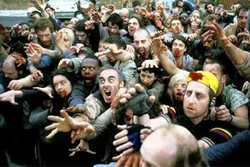
Movies
Critical Perspectives

Critical Perspectives: The Zombie Apocalypse is Upon Us!
Filed under: Critical Perspectives
There's a reason "critically acclaimed horror film" sounds like a paradox. The genre suffers from poor production values and inept acting. Clichés cling to them like mange on a stray dog. Their success lies in their ability to capitalize on the most primal human instinct: fear of death. The form of the nightmare -- a dark amorphous mass in its infancy -- is given shape by the culture and time we inhabit. When we look beyond the silly screaming half-naked girls, chainsaw wielding psychos, and shoddy monster make-up, we see our collective fears in the flesh. Fear forces us to face that which we do not want to face; it catches us defenseless, laid bare.
Without even trying, a horror movie stands as the rarest of cultural artifacts, an unguarded insight into our shared preoccupations. Frankenstein was the monstrous progeny of the scientific revolution, Godzilla of post-WWII/post-atom bomb Japan; Norman Bates, Michael Myers, and Jason slashed into being just as the press sensationalized a new type of criminal, the "serial killer". In hindsight, a work's context often seems apparent. However, it is a more onerous task to uncover that context in one's own time.
The aforementioned monsters still make occasional cameos but to diminished crowds and few scares. Only vampires and zombies seriously contend for a market share. In many ways the two monsters have a lot in common: they are dead creatures given unnatural life, their condition synonymous to a disease. The vampire, once a cypher for sexual deviance in the prudish Victorian years, has been stripped of its allegorical weight and transformed into a matinee idol. In this "youth obsessed" culture, the beautiful forever-young creature, whose basic sustenance (sucking blood) fizzes with erotic nuance, seems more a blessing than a curse. Conveniently, the sanguinary monstrous aspect has been tidily remedied by modern science as in True Blood or a diet of animal blood as in the Twilight series. The vampire, in short, has lost its teeth (sorry -- I couldn't resist). The zombie, on the other hand, still knows how to scare you.
As I watched World War Z last Friday, I asked myself why zombies are such effective monsters. During the 20th century they underwent a dramatic makeover. The walking dead of 1932's White Zombie were enslaved by a curse, their will commandeered by a voodoo master. For the modern zombie, the magical origins have been commuted to epidemiological ones. Also, the contemporary film/show eschews the traditional pure horror genre for the hybrid apocalypse-horror genre (28 Days Later, Dawn of the Dead, The Walking Dead, World War Z, and on and on). I believe this is an important clue in understanding the zombie's current cultural context.
Are they simply a personification of a disease? Microorganisms, inscrutable to the human eye, are difficult to dramatize. Even a disease with grotesque features like black pustules erupting blood and bile falls short -- the victim remains a huddling, fevered mass not doing much other than dying, passing the sickness through an act as banal as a cough or sneeze.
Another possible explanation for the zombie's current popularity, is they satisfy some normally unacknowledged part of our nature that thirsts for epic carnage. Here they achieve something nifty: since a zombie is only a walking corpse, thus lacking humanity (reason, a soul, whatever you want to call it), we can enjoy the severed limbs and blown off heads with ebullient abandon -- our primal blood-lust satisfied with a clean conscious.
While I believe both of the above points partially explain our modern zombie obsession, something is still lacking. What of the creature's will? As I mentioned,the zombie of the early 20th century was the slave of another's will; in contrast, the contemporary zombie is will-less. In an age when sociobiology has trumped secular humanism, we have stopped thinking of ourselves as apart from the animal kingdom. We understand ourselves not so much as thinking individuals but as a herd. As a species we are violent, destructive to ourselves and the world around us. A character in World War Z comments (paraphrased), "We cannot believe something is possible until it has already happened." Despite our ability to predict the dire outcome of our actions, collectively we often are unable to alter our behavior to prevent catastrophe. Perhaps the best example today is climate change -- a phenomenon widely acknowledged by scientists that may drastically alter the planet forever. Nevertheless we, en masse, are for the most part doing nothing about it. With the world population bursting at over 7 billion, it is difficult (if not delusional) to take comfort in the power of one. Even if you buy local organic food, cycle to work, and have only two children, that won't prevent your neighbor from frequenting McDonald's, cure America's addiction to automobiles or stop a population explosion in India. As individuals we make rational choices. As a species we are chaotic, irrational and self-destructive.
The zombies of World War Z behave like a horde of insects, forming human towers to scale hundred foot walls. As a mindless herd, operating on instinct alone, they crush each other in order to mete out absolute annihilation of humankind. Like termites eating the timbers of Noah's ark, we gnaw away at the very things that sustain us. The zombie apocalypse is a global lynch mob; the individual will be usurped by the unthinking "will" of the majority. And this is what makes them so scary.
Tags: World War Z, Zombie, White Zombie, The Walking Dead, True Blood, Dawn of the Dead, horror movie, zombie apocalypse
Related Posts
- True Blood: Radioactive
- True Blood: Life Matters
- True Blood: Dead Meat
- True Blood: In the Evening
- True Blood: Don't You Feel Me




Comments Posted (